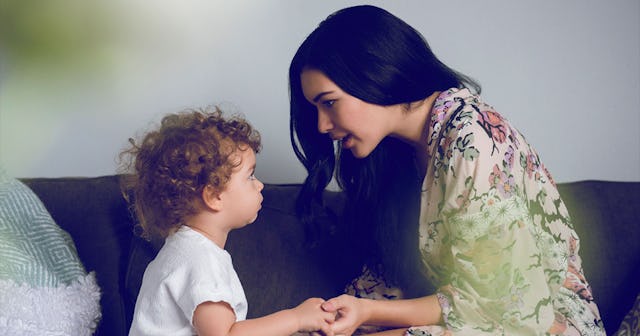Tough Conversations With My Toddler: Not Everyone Will Like You

As adults, we’ve probably learned the hard way that not everyone in this world is going to like us. It’s a tough realization that could hurt. And for those who weren’t taught differently, they often internalize other people’s thoughts and their self-worth and confidence plummets. So, do we save our children from that same hurt by sharing with them that in this life not everyone is going to like them? Or do we let them figure it out the hard way like we did? If we do try and prepare them for this truth, what age should we do it?
Each case is different. Each child is different. But I do think that in order to combat the lack of self-confidence that can result from the tough realization you’re not liked, it’s important to have that conversation with your child early. Teach them that their self-worth isn’t linked to the shit people think about them.
Towards the end of last year, I went to pick up my three-year-old daughter from a tutoring session. She is so eager to start school and showed signs of being ready to learn more than I was teaching her at home, so we did one session a week to stimulate her mind and help her grow. On this particular day, after she got into the car, her tutor said to me, “I just want you to know that there will be some people who are jealous of Ariella. Even some adults will be intimidated by her…”
I see her tutor as a mentor to my daughter and I know she meant well and was just preparing me. Ariella is a very endearing child, smart and wise beyond her years—this will not be accepted by everyone. Regardless of what I knew, this was an unexpected conversation that I reflected on almost every single day after that.
Halfpoint/Getty
Between the conversation with her tutor and several occasions where friends didn’t want to play with her or were downright mean to her, I knew the time had come to have this conversation. She’s the youngest in her friend’s circle, but I always played it down to little kids just being little kids. I hadn’t given much thought to the fact that in her later years, kids may intentionally not want to associate with her because of jealousy.
I knew I had to save her from the hurt later in life by preparing her to be strong and confident when she experiences this tough reality. Absolutely no one in this life is made for everyone—and that is okay.
I admit, even the thought of having this conversation made me nervous because I didn’t know what the right way to approach this was. Is there even a “right” way? I still don’t know!
I worried she was too young.
I was afraid it would make her sad because her sweet innocent mind wouldn’t understand why people wouldn’t want to play with her.
But, to my surprise, the conversation went better than expected. I told her that sometimes other kids may not want to play with her. She asked why. I explained that it’s nothing against you, sometimes they just won’t feel like it, and that’s totally okay. If it does happen, it’s not because you did anything wrong!
After the conversation I asked her what she would do if someone doesn’t want to play with her.
Ariella responded, “I’ll ask if they can be my friend!”
I let her know that that is a very sweet response, but if they really don’t want to play with you, you can just go make friends with someone else. She said okay and we moved on.
We had the conversation a couple days later and I asked again, “What will you do if someone just doesn’t want to play with you?”
She replied, “I’ll ask if they can be my friend, and if they don’t want to be, that’s okay, I will go play with someone else!”
In typical Ariella fashion, she’s teaching her 16-month-old sister this concept now too. It’s a perfect excuse when she wants to do her own thing and her sister wants to play. She loves her sister, but sometimes just wants to be alone, so it’s helping her to realize that it’s nothing against her if someone doesn’t want to play. I think this scenario ended up being a perfect way to simply explain a more complex issue that she may face later in life.
We are heading in the right direction in preparing her to not feel entitled to be loved by everyone, because it’s probably not going to happen. It’s a hard reality as a parent too, but if you do what you can to prepare them for adversity, they’ll shine in the face of it later in life. And as parents, that’s one of the greatest gifts we can give.